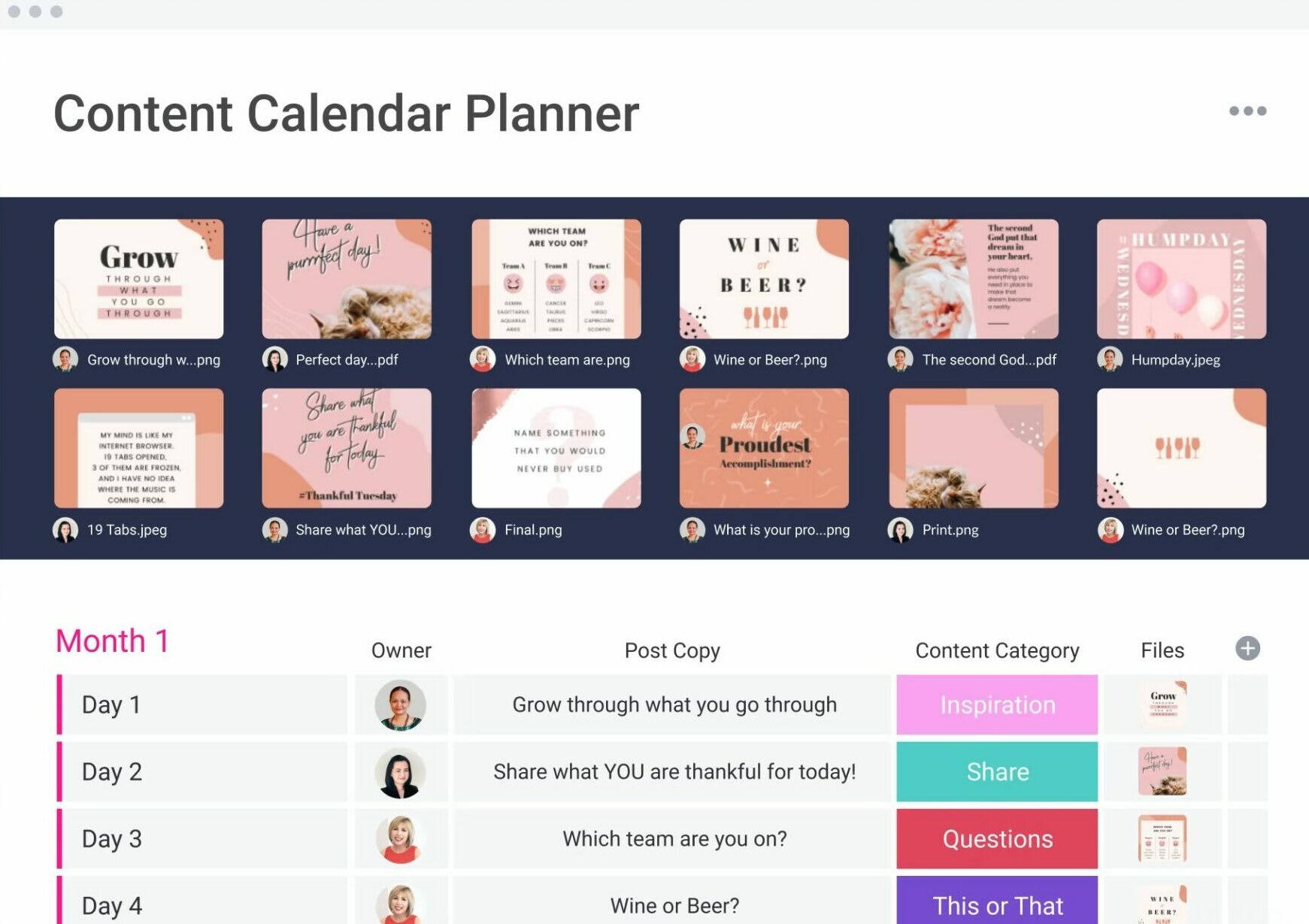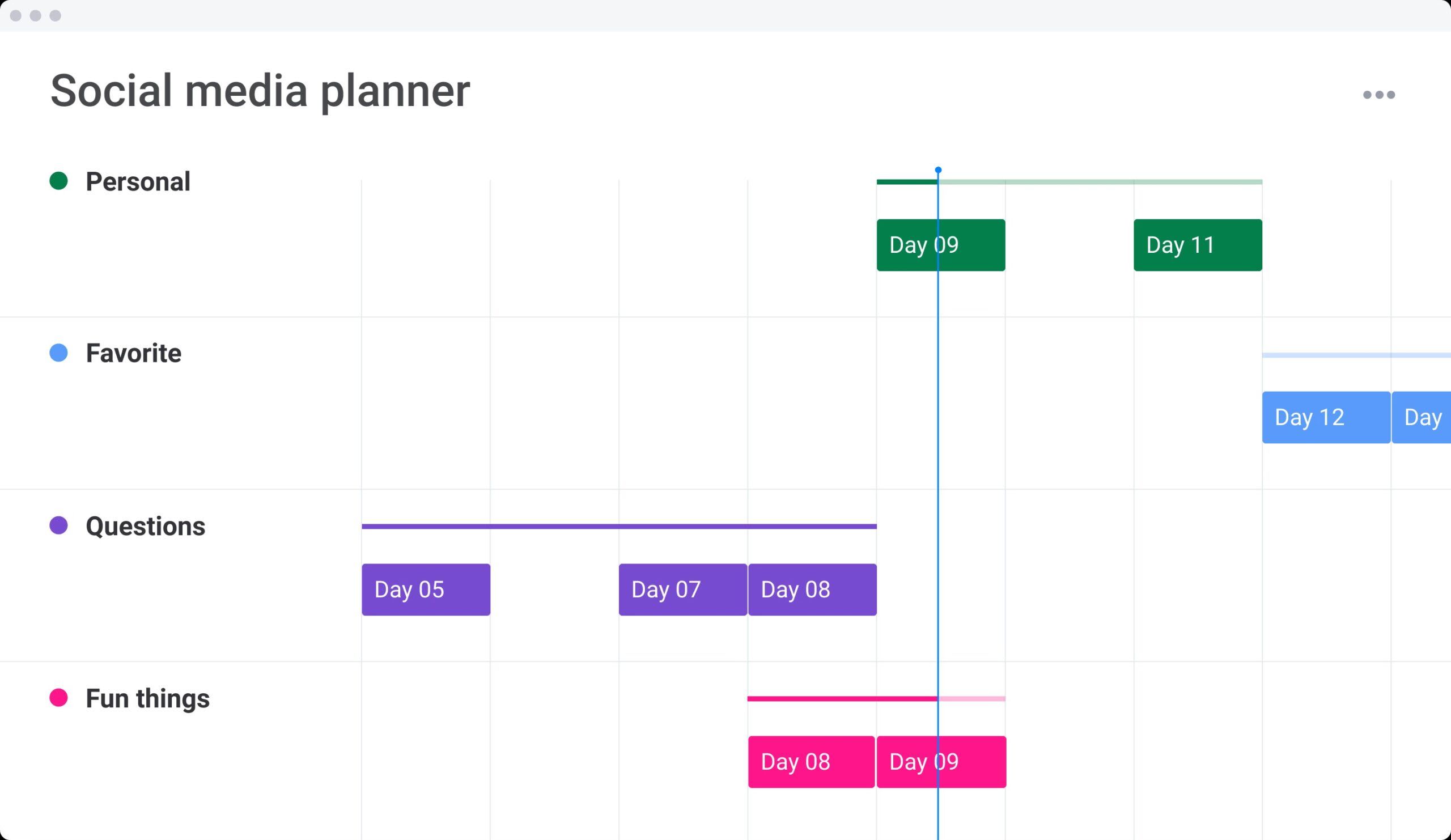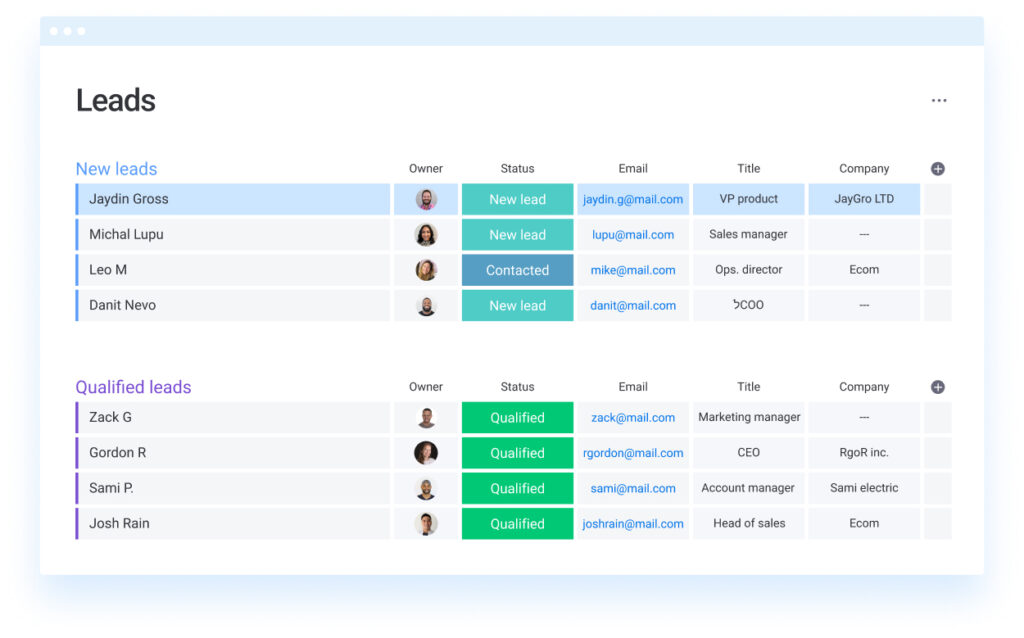Customer expectations have evolved with technology and social media. Your customers value the ability to contact you in a manner that’s most convenient for them, and social media is growing in popularity as a means of getting their questions answered. Using a social CRM (essentially a CRM with social media integration) is a must for any business looking to enhance customer experience and marketing efforts.
In this guide, you’ll learn the ABCs of how social media, CRM software, and flexible work management software can be combined to help your business achieve its goals. We’ll also provide some best practices for using monday.com as a social media CRM system.
What is a social CRM?
Customer relationship management software (CRM) tracks all the communication your business has with a customer via telephone, email, or live chat. A social CRM takes this one step forward by adding the option of a social media integration to tie all your social channels, such as Twitter, Facebook, and Instagram, together with your CRM.
For example, if your customer sends you a DM through your Instagram account, the conversation is visible in your CRM, along with emails, phone calls, and live chats.
A social media CRM streamlines all interactions your customer has with your brand into one location, so it’s easy to refer back to past conversations.
Social customer relationship management is a necessity for achieving your business’s customer support and marketing goals.
What goals can CRM with social media integration help you achieve?
At the end of the day, connecting your social media management through your CRM is more efficient than keeping them separate. There are many benefits to social media CRM integrations that can positively impact your business.
1. Provide better customer support
Many customers prefer using social media to contact a company when they require support — it’s more convenient, and they don’t have to search for your contact details. Social customer service is especially effective in this regard. Using a CRM with social media integration enables your teams to reach customers wherever they’re hanging out online.
A social CRM keeps all of these interactions in one place. Customers won’t have to repeat themselves when contacting you about a recurring or past issue because a CRM stores their entire conversation history in chronological order.
2. A better understanding of your customers
Social media provides rich data about your customers, including other brands they follow, the posts they interact with, and how they communicate with your company. Integrating social media into your CRM gives you insight into their buying habits, opinions about your brand, and personality traits.
In turn, your marketing team can create more detailed buyer or user personas for targeted marketing campaigns. They can learn about customer pain points and market-specific solutions to them at the right time. Your sales team can leverage this data to predict their future buying needs and generate new, more valuable leads.
3. Build trust in your brand
A CRM with social media integration helps increase engagement with your customers. Customers value authentic interactions with brands, so providing quick replies and getting involved in conversations reveals the ‘’human’’ side of your business.
With these goals in mind, let’s explore some best practices when implementing a CRM with social media integration like monday.com to achieve the best results.
Best practices for using a CRM with social media integration
Measure core social media metrics
Social media metrics can be incredibly effective at enhancing your marketing, sales, and customer support performance.
Key metrics to analyze include:
- ROI: The amount you invested through social media campaigns vs. the amount of profit you’ve made
- Audience demographics: Your following’s age, gender, location, etc.
- Engagement rate: The total number of likes, comments, shares, saves, and reactions compared to the number of followers you have — engagement is far more valuable than the number of followers alone
- Conversion rate: How many sales, click-throughs, or visits you’ve made through social media
Ensure your brand voice is cohesive
To build trust and positive relationships with your customers, you’ll need to maintain a consistent brand voice everywhere they come into contact with your company. That means content across your social profiles, emails, and live chats need to have the same emotional tone and personality.
Enable social listening
Customers like to talk. Although they interact with you through direct messages and comments on your social media posts, they also mention their experiences with you without deliberately involving you at all. For example, this could be in a comment on a competitor’s post or a Twitter thread with other customers.
Social listening is tracking social media platforms for mentions of your brand or conversations surrounding your industry, then analyzing them for insights and trends to help you make better-informed decisions about products, services, and your organization as a whole. Enabling social listening tools keeps you aware of what people are saying about your brand online — whether they tag you or not.
Social listening provides your customer support team with feedback directly from customers about ways you could improve your service, without them ever needing to contact you directly.
Achieving your business goals is easier with a CRM that includes social media. To keep everything in one place, you need a robust and flexible CRM.
Using monday CRM as your social CRM
Every business has different needs when it comes to managing projects and processes. The monday.com Work OS houses your customer conversations, lead generation, and marketing campaigns in one place to make managing customer relationships easier and more efficient.
With the easy-to-use, adaptable monday CRM you can:
- Customize your sales cycle: Tailor our CRM to work for you by editing deal stages and managing multiple pipelines from one customizable dashboard.
- Centralize client communication: Integrate your email to automatically log client communications. Personalized email templates reduce time spent on tedious communications while improving workflow.
- Automate your sales processes: Save time by assigning leads to reps automatically. Set reminders and receive crucial notifications so you never miss an event, deadline, or opportunity.
Each team can monitor, track, and edit projects all in one place and even set reminders and due dates for specific tasks. Your sales, marketing, and customer support strategies are manageable in real-time using our cloud-based Work OS and utilizing templates and integrations.
Potential social media-related integrations with monday CRM:
- Hubspot
- Slack
- Zoom
- Google Calendar
- Gmail
- Facebook Ads
- HootSuite
How can you empower your teams to create effective social media strategies that improve customer support, sales, and marketing? Browse our template center for a customizable monday.com template to get you started in no time.
Related templates to CRM with social media integration
Your social CRM is even more effective with a strong social media strategy. Our monday.com templates help you plan and manage the content calendar for your social media channels in the same place you track your sales pipeline.
Social media calendar template
Our Social Media Calendar Template enables you to manage your entire social media strategy across all platforms. Simply connect your social media platforms and add your content, actions, and designs with publishing dates. You can assign tasks to team members and view outstanding tasks in a checklist or calendar view.

Social media planner template
Writing and designing your social media content is only half the battle. With our Social Media Planner Template, you can get an in-depth picture of your social media analytics, post impressions, and content calendar in one place. Schedule your content across all social media platforms, and measure the performance once they’re published.
Your team can even attach design assets and assign tasks to other team members to keep posts accurate and on time.

Templates can get you started on the right track to creating an impactful social media presence. How can you use these in conjunction with a social media CRM for the best results? We’ve answered some common questions.
FAQs about social CRM
How does social media affect CRM?
Integrating social media channels into your CRM combines and tracks communication through platforms, such as Facebook and Instagram, in the same way as traditional channels, such as email and phone calls. Converging all these channels helps customer support, sales, and marketing teams understand customers better, create better customer profiles, and offer quicker, more efficient service.
What are the benefits of social media tools for relationship management?
Integrating social media tools in your CRM improves the relationship with new and existing customers by updating all communications across every channel and platform in real-time. Simultaneously, sales and marketing teams build a clearer idea of your audience and how well certain posts are performing.
What is the difference between social CRM and traditional CRM?
A social CRM has all the elements of a traditional CRM, while also including capabilities to track customer relationships on social media. Traditional CRM without social media integration only allows users to monitor more standard customer interactions through emails and phone calls.
Leverage a social CRM to elevate your customer relationships
While customers appreciate prompt and friendly service, they also expect your business to help them on the platform of their choosing. A CRM with social media integration can help your teams manage and nurture customer relationships by accessing all communications in one place.
Sales and marketing teams can learn more about customers using the rich data provided by social media and tweak marketing campaigns to be more effective. monday.com empowers your teams to build successful customer support and marketing strategies all in one place with our robust Work OS and flexible templates.


